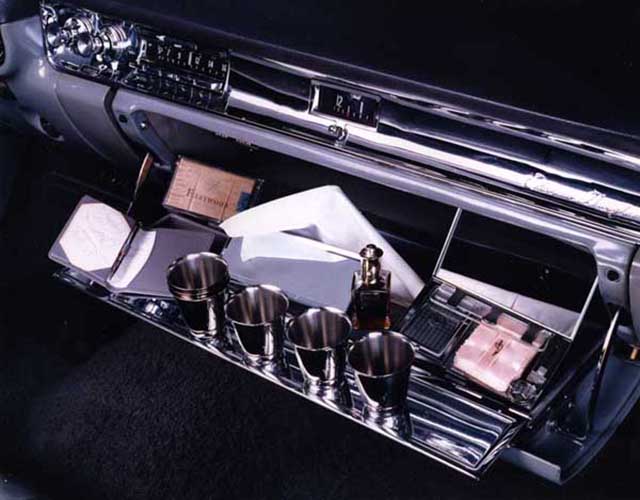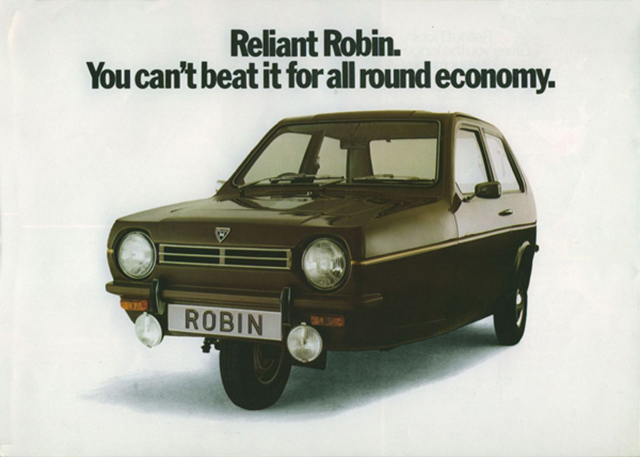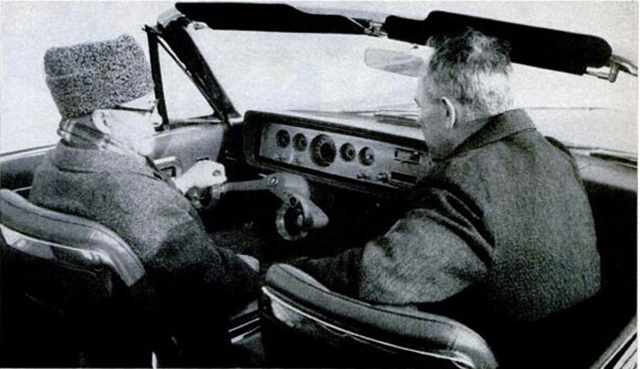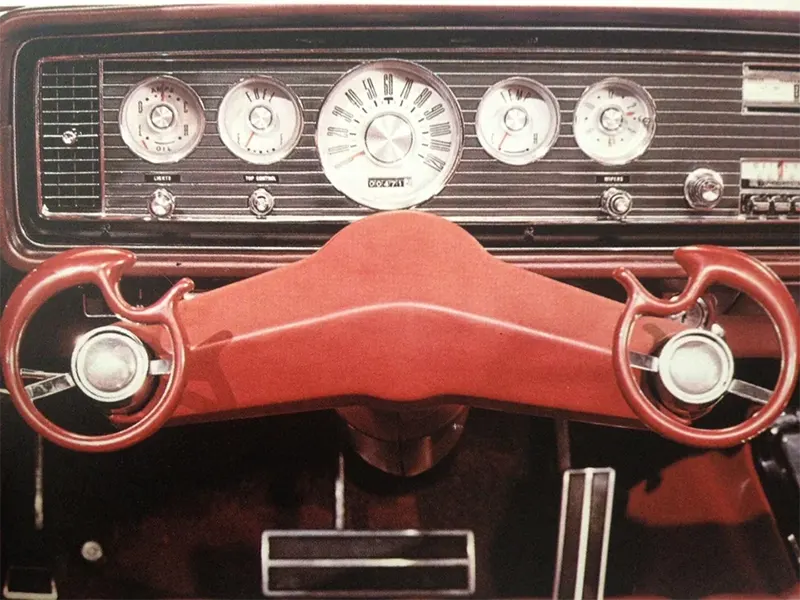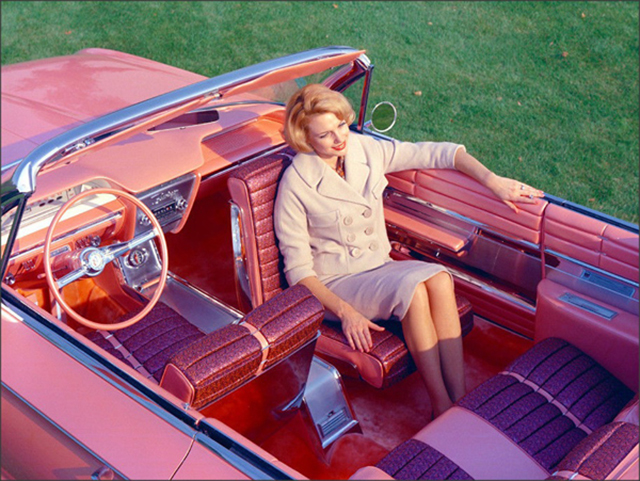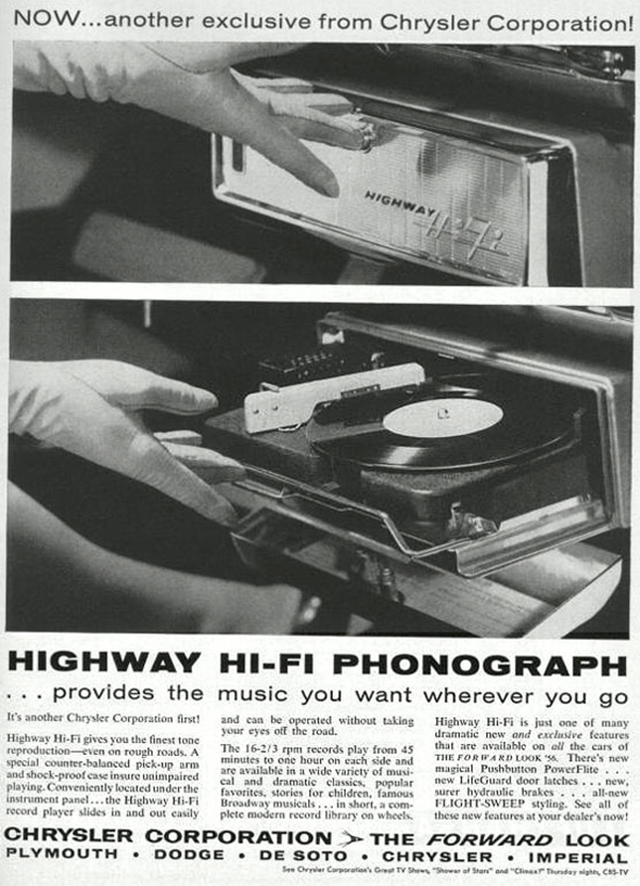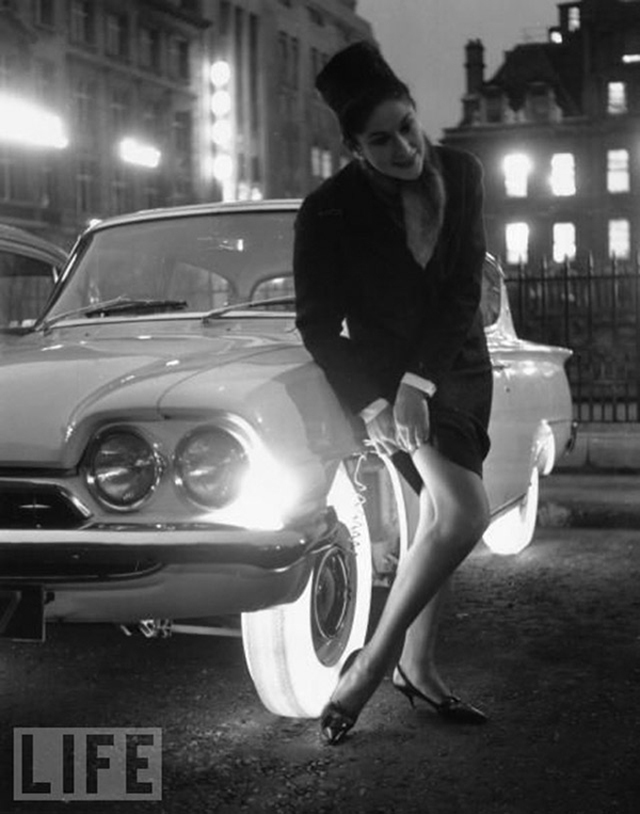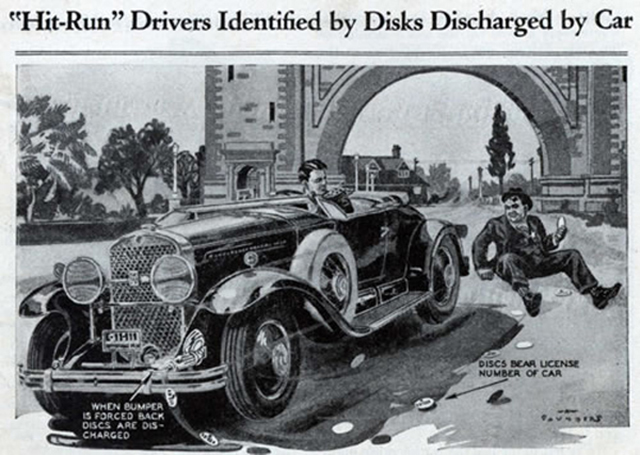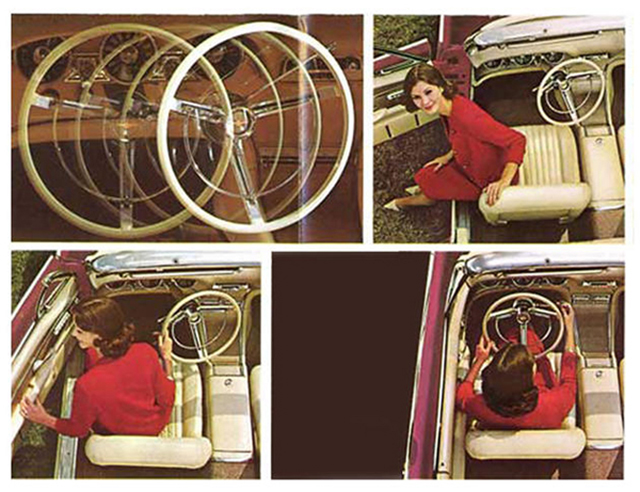Reflecting on cars from past decades might bring to mind their appearances, but often overlooked are the myriad features that accompanied these vehicles. In hindsight, many of these concepts were undeniably innovative, yet within that realm of innovation, some ideas appeared outright eccentric or unusual. Looking back, it’s fascinating to see the range of forward-thinking innovations and, in contrast, some rather unconventional or offbeat features that were a part of automotive history.
Minibar in the car
Before the implementation of stringent laws against driving under the influence, the 1957 Cadillac Eldorado Brougham boasted an array of extravagant features. Encapsulating the opulence of its era, this remarkable car featured a sophisticated magnetized minibar discreetly placed within the glovebox. In addition to this deluxe amenity, it provided a complete set of women’s grooming accessories, a stylish leather notebook, a cigarette case, a comb, and an atomizer filled with the delightful fragrance of “Arpege Extrait de Lanvin” perfume.
The Reliant Robin Micro-Car
Manufactured in the U.K. for an impressive 27 years, the Robins gained significant popularity, particularly in northern England. These vehicles fell under the classification of motorcycles due to their three-wheel structure, forgoing the presence of a fourth wheel. This classification meant that only a motorcycle license was necessary, leading to reduced costs for registration and insurance, a perk that appealed to the working class. Their lightweight construction also made them surprisingly adept in snow, seldom getting stuck; their buoyancy allowed them to smoothly traverse over snow banks. However, the Reliant Robin did have its drawbacks. Its three-wheel configuration made it prone to tipping over during turns. Enthusiasts suggested balancing the car’s weight by loading the passenger side with a heavy object like a cement block or a toolbox to counteract tipping. Alternatively, the advice was simply to drive it straight to avoid any tipping hazards.
A new steering wheel by Ford
Back in 1965, Ford introduced the Wrist-Twist steering system, aiming to offer a more comfortable driving experience and an improved view of both the road and dashboard instruments. Ford claimed that this distinct set of small wheels would make parallel parking effortless. However, concerns were raised about the system’s potential drawbacks in emergency situations.
Critics feared that the Wrist-Twist steering might pose challenges during unexpected incidents, prompting some to dub it as an invitation to be part of the car crash club.
1961 Buick Flamingo’s rotating seat
Take a look at the 1961 Buick Flamingo, a show car designed for the last General Motors Motorama event. This remarkable vehicle is essentially a ’61 Buick Electra 225 convertible, uniquely finished in a striking Flamingo Pink color. The interior boasts two-tone pink leather and distinctive floating bucket seats, offering a 180-degree swivel feature specifically on the passenger side. A wide console with bright-metal trim ran between the front bucket seats, although the shift lever for the Turbine Drive automatic transmission remained on the steering column. The clock, mounted in the top of the dash on the production Buick, was relocated to the console riser, where it could possibly be mistaken for a tachometer.
Highway Hi-Fi Phonograph
In 1956, Chrysler, DeSoto, Dodge, and Plymouth vehicles were equipped with the Highway Hi-Fi. These in-car record players used heavier records to reduce skipping and played at a slower speed of 16 2/3 rpm, extending the playtime to 45 minutes. Manufactured by CBS – Columbia, the available selection of artists was confined to those under the Columbia label. In 1960, RCA produced a non-exclusive player capable of playing standard 45s, but it had a higher susceptibility to malfunction.
Illuminated Tires
Back in 1961, Goodyear launched illuminated tires, but the concept was later abandoned. The design involved inflatable tubes, light bulbs made of glass, and the unpredictability of encountering potholes. This combination raised concerns about potential risks and complications, leading to the ultimate decision to halt the idea.
Dog Sack
In an issue of Popular Mechanics dated June 1935, an interesting concept was introduced. It aimed to solve two things at once: keeping cars clean and letting dogs enjoy fresh air while riding. However, despite the idea being presented, it never became a real thing in any cars. Dogs all around probably felt relieved—they continued riding without this specific feature, sticking to their usual way of enjoying car trips.
Dischargeable discs for the driver’s identity
In a publication from 1931 by Popular Mechanics, an inventive concept was introduced to address hit-and-run incidents. The proposal suggested a unique device installed on the bumper, designed to release identification discs upon a collision with a victim. These discs would display the car’s license number and the driver’s name. This innovative idea aimed to hold accountable those responsible for hit-and-run accidents. Indeed, it’s an idea that might find favor with many, as it sought to create a system for identifying and addressing such incidents, potentially aiding law enforcement and ensuring greater accountability in road accidents.
Amphicars
Amphicars were a unique type of convertible vehicle that boasted a small rear-engine four-cylinder Triumph motor. What set them apart was their twin propellers designed for navigating through water and a four-speed transmission tailored for on-road use. Manufactured and sold between 1961 and 1968, these cars, while not excelling as either a proper car or a full-fledged boat, managed to attain a maximum speed of around 70 mph on land and approximately 7 mph when cruising in water, although achieving such speed on water might have been a stretch. One notable downside was their tendency to sink if the bilge pump, responsible for expelling water from the hull, failed.
The 1961 Ford Thunderbird with a special steering wheel
Available for an extra $25, the 1961 Ford T-Bird offered an optional feature known as the Swing-Away Steering Wheel. This innovative feature was designed with a special steering column that could shift approximately 10.5 inches to the right. The main intention behind this engineering marvel was to make it more convenient for the driver to enter and exit the car, especially when they needed to carry items. It allowed the driver to move the steering wheel out of the way, creating additional space and facilitating easier access to and from the vehicle, ultimately enhancing the overall comfort and convenience of driving the ’61 Ford T-Bird. (Photo credit: Michelle Nati via ODDEE / Pinterest). Notify me of new posts by email.
Δ Subscribe

